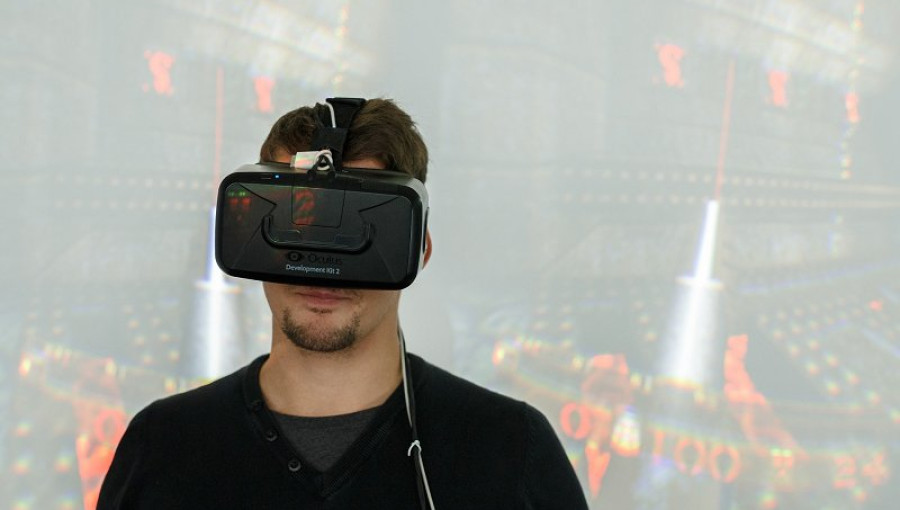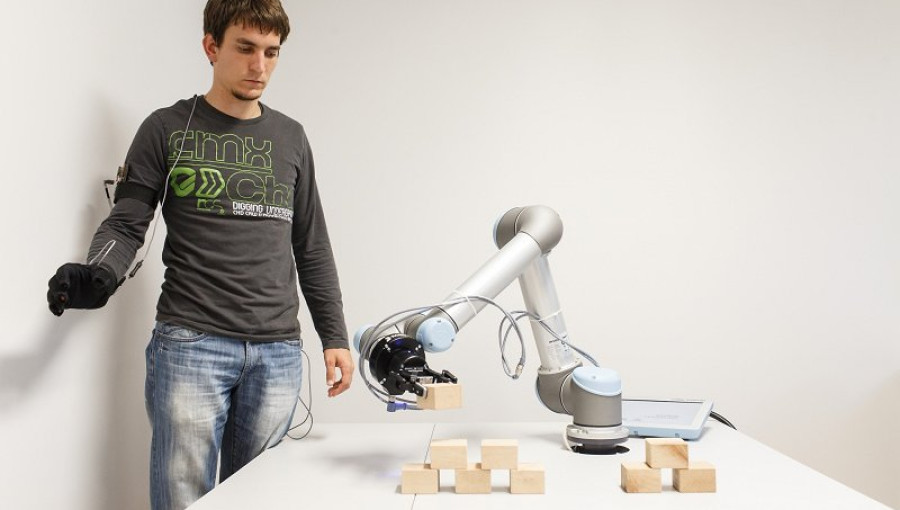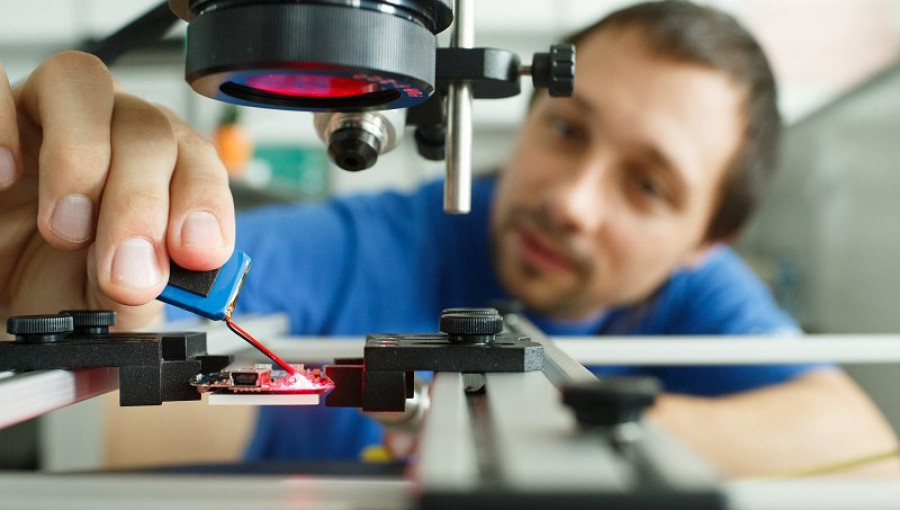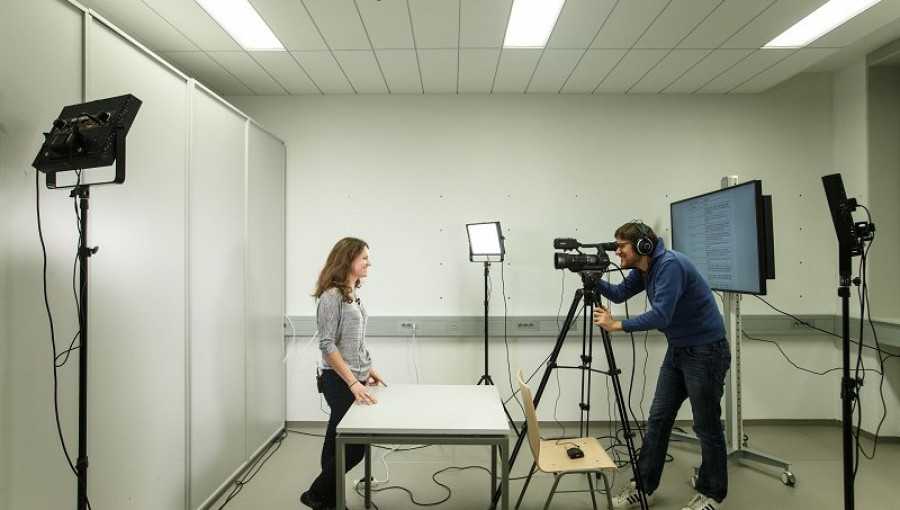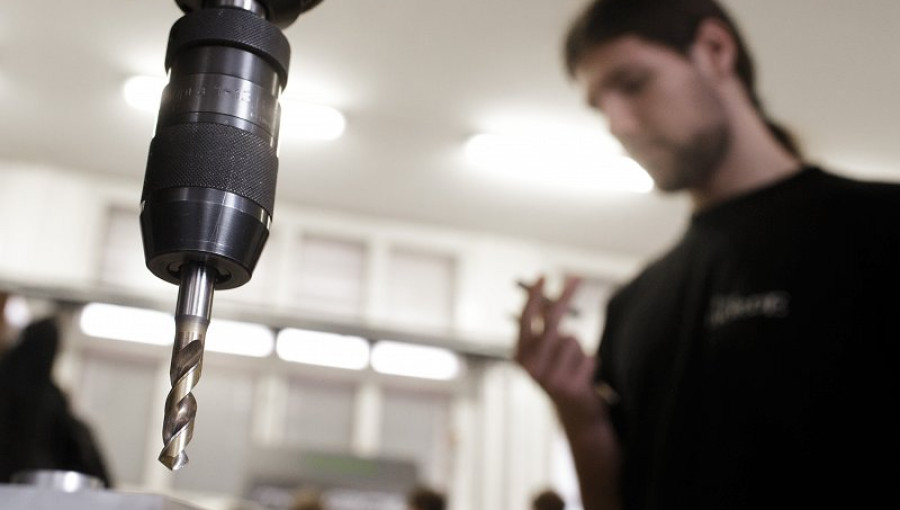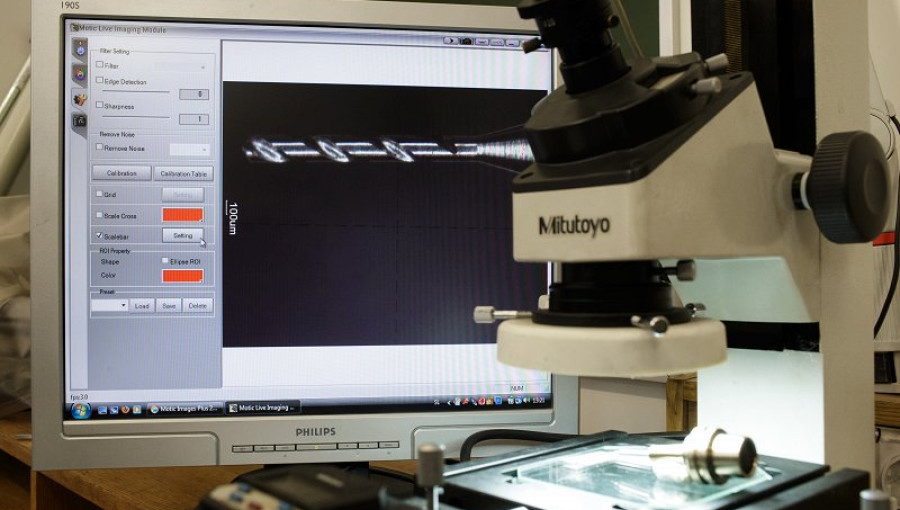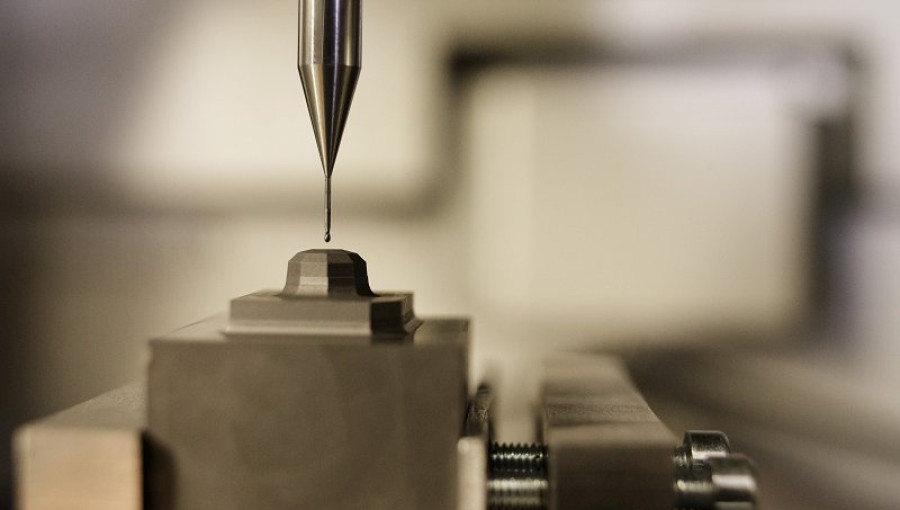Faculty of Electrical Engineering
Research work at the Faculty of Electrical Engineering of the University of Ljubljana (UL FE) is carried out in laboratories and in programme and research groups. The Faculty of Electrical Engineering has 27 research laboratories within nine departments. The Faculty's laboratories carry out various forms of research and development cooperation with Slovenian industry: they train young researchers from the economy, participate in centres of excellence, competence centres, technology platforms and networks, carry out research and development projects, cooperate with Slovenian industry, industry of other countries and are involved in projects of framework programmes and other European Community programmes.
The Faculty of Electrical Engineering is active in the following scientific research areas:
- Electrical Power Engineering, Photovoltaics,
- electronics, microelectronics, optoelectronics, microsensors and nanostructures,
- mechatronics, embedded systems, intelligent automation systems and robotics,
- metrology and quality assurance,
- Biomedical Engineering and Informatics,
- Information and communication and multimedia technologies.
I. DEPARTMENT OF FUNDAMENTALS OF ELECTRICAL ENGINEERING, MATHEMATICS AND PHYSICS
- Laboratory of Physics
- Laboratory of Fundamentals of Electrical Engineering and Electromagnetics
- Laboratory of Applied Mathematics and Statistics
II. DEPARTMENT OF ELECTRICAL POWER SYSTEMS AND DEVICES
- Laboratory of Electrical Networks and Devices
- Laboratory of Power Systems
- Laboratory for Energy Policy
- Laboratory of Electric Power Supply
- Laboratory of Lighting and Photometry Laboratory
III. DEPARTMENT OF ELECTRONICS
- Laboratory of Photovoltaics and Optoelectronics
- Laboratory of Microsensor Structures and Electronics
- Laboratory of Microelectronics
- Electronic Design Automation (EDA) Laboratory
- Laboratory for Integrated Circuit Design
IV. CHAIR FOR MEASUREMENT AND ROBOTICS
- Laboratory of Metrology and Quality
- Laboratory for Robotics
V. DEPARTMENT OF BIOMEDICAL ENGINEERING
- Laboratory of Biocybernetics
- Laboratory of Imaging Technologies
VI. DEPARTMENT OF MECHATRONICS
- Laboratory of Electrical Machines
- Laboratory of Electric Motor Drives
- Laboratory of Control Engineering and Power Electronics
VII. DEPARTMENT OF SYSTEMS, AUTOMATION AND CYBERNETICS
- Laboratory of Control Systems and Cybernetics
- Laboratory for Machine Intelligence
VIII. DEPARTMENT OF INFORMATION AND COMMUNICATION TECHNOLOGIES
- Laboratory of Information Technologies
- Multimedia Laboratory
- Laboratory of Radiation and Optics
- Laboratory of Telecommunications
- Laboratory for User-Centred Communications and Ambient Intelligence
Faculty of Computer Science and Informatics
It offers research, development, consultancy and educational services in the field of computer science and information and communication technologies (ICT). Research and development work is carried out in 20 laboratories, organised into six departments. The work includes research and development and application projects, innovation capacity building and the establishment of an Innovation Centre at the Faculty of Computer Science and Informatics.
The Faculty of Computer Science and Informatics of the University of Ljubljana conducts research in key areas of ICT:
- Machine Learning and Artificial Intelligence
- Machine perception and multimedia
- Systems and networks
- Software Engineering and Informatics
- Theoretical Computer Science and Mathematical Methods
- Computational Biology
Researchers at the Faculty participate in a number of EU and other international and national programmes and research and development projects funded by the European Commission, the European Structural and Investment Funds, the Slovenian Public Agency for Research Activities and others. Researchers regularly collaborate with partners from the business sector to develop concrete solutions through applied projects that enhance the development of computer science and information and communication technologies.
The Faculty builds a community of students, academia and business, and provides students with networking, technological skills and practical experience through activities:
- FRI Garage – Student Technology Accelerator
- Frizider – where nothing goes wrong, a makerspace at UL FRI
Faculty of Maritime and Transport
It carries out research and consultancy in the fields of maritime affairs, transport and logistics, education and training, and student recruitment.
The Faculty of Maritime and Transport of the University of Ljubljana (UL FPP) successfully carries out numerous research projects, researchers participate in national and international scientific and professional consultations in the field of maritime and transport and related activities, their findings are regularly published in peer-reviewed articles and papers in important scientific journals and proceedings, and they write textbooks and manuals, scientific monographs.
The Faculty carries out research, applied research, development and other projects, as well as professional development and consultancy work in the Institute of Maritime and Transport, which includes the following research groups:
- Maritimes studies
- Traffic and transport studies
- Transport Logistics
The bulk of the research and development at the FPP is carried out through the Programme Group "Modelling and simulations in traffic and maritime engineering".
This multidisciplinary programme aims at developing and upgrading theories, algorithms and computer programs to gain a deeper understanding of various phenomena and processes and to solve various practical problems arising in the field of transport and maritime engineering.
Given the breadth of the field, the programme's research focuses on areas in which
in which the intended team members already have a strong track record. These areas are:
- Transport and maritime systems
- Transport safety and transport risk analysis
- Vessel dynamics and their impact on the environment
More information here.
Faculty of Civil Engineering and Geodesy
The Faculty of Civil Engineering and Geodesy at the University of Ljubljana (UL FGG) conducts research and development work in the fields of civil engineering, geodesy, water management and environmental engineering. Research and development is carried out both within and outside the national research programme, either within Slovenia or through participation in European and other international projects and cooperation with industrial partners.
Key research and development activities are carried out within six programme groups: Earthquake Engineering, Water Engineering and Geotechnics, Building Structures and Building Physics, Mechanics of Structures, E-Construction, Geoinformation Infrastructure and Sustainable Spatial Development. All teaching staff from the Faculty's 21 teaching and research units are involved in research. Some of the teaching-research units are affiliated to the following research institutes: the Institute of Structures, Earthquake Engineering and Computing (IKPIR), the Research Institute for Geo and Hydro Risks (RIGHT) and the Water and Geotechnical Institute (VGI). Experiments and measurements are carried out in the Hydraulic Engineering Laboratory, the Structural and Mechanical Engineering Laboratory and the Soil Mechanics Laboratory.
The Department of Civil Engineering is involved in research in the field of response analysis of buildings, bridges, geotechnical structures, hydraulic and other engineering structures and transport, taking into account the various impacts from/on the environment. An important part of the research is devoted to the development of procedures for the design, construction, maintenance and management of all types of civil engineering works including roads, railways and utilities infrastructure to ensure the sustainable functionality of the built and living environment. Research and development is supported by the use of information and communication technologies.
The Department of Surveying is involved in research on spatial data infrastructure, which is one of the key infrastructures of modern society and requires coordination between providers and users at national and international level. Research is aimed at providing a reference base for spatial data, the production of spatial data using a growing number of technologies, and the integration and use of spatial data for the development of new socially useful services.
The Department of Environmental Civil Engineering is involved in research on the sustainable use of water resources, surface and ground inland waters and the sea, as well as on renewable energy sources. The development of design processes and application of technologies for water supply, water power and biogas recovery, purification of drinking water and waste water, flood protection and the spread and removal of pollutants in the natural and built environment is supported by basic research in fluid mechanics, hydrology, hydraulics, ecohydraulics, hydraulic engineering and environmental engineering.
Faculty of Mechanical Engineering
The Faculty of Mechanical Engineering of the University of Ljubljana (UL FS) fulfils its social mission in the field of scientific research and development and application. Its priority is to ensure a high level of scientific excellence and the smooth transfer of new research findings into the industrial environment.
Research activities are carried out in 40 laboratories, which provide comprehensive support in all four areas of research:
- Machine design and construction,
- Energy and Process Mechanical Engineering,
- Production Mechanical Engineering and Mechatronics.
The Faculty of Mechanical Engineering is one of the faculties that work very closely with industry in the field of research and development, which has a decisive influence on the Faculty's research work. In addition, the Faculty has strengthened its cooperation with companies in the field of joint applications for public tenders, both national and international. We also organise various joint teaching workshops, which are mainly intended as complementary training for professional staff from companies. For example, for the third year in a row, the Faculty organised a summer school for secondary school students and teachers.
Research work is a fundamental basis for modern and high-quality pedagogical work, which is why all teachers are intensively engaged in research work. This is reflected in the bibliographic data as well as in the number of research projects and applied development tasks for the economy. The knowledge gained from research and development assignments is passed on to students both through teaching work and through participation in international and national conferences and symposia.
Several laboratories at the Faculty of Mechanical Engineering are part of interdisciplinary research centres participating in interdisciplinary programmes. Thus, we collaborate with faculties, institutes and other research organisations in the fields of medicine, electrical engineering, chemistry, computer science, civil engineering, etc.
An important acquisition in 2011 is the most powerful supercomputer in the Slovenian university environment, which we have named HPC (High Performance Computing). This is reflected in its increasing use in projects with industrial partners and in Horizon 2020 research projects. In addition, HPC is an important link to other research organisations and to collaboration on interdisciplinary projects. Each year, we run a summer workshop on high-performance computing for prospective science students to showcase the possibilities offered by HPC.
Faculty of Architecture
As a field of research, architecture is inherently interdisciplinary and is vividly embedded in a broader field of research. Architectural theory and architectural design, from the point of view of art, intervene in the humanities; urbandesign, in particular, links engineering and thesocial sciences; and architecturalplanning, as a construction technique, links the humanitieswith engineeringand, to some extent, biotechnicalfields (e.g. landscape architecture). Thus, the FA is involved in research on architecture, urbanism, interior design, digital design, architectural technology, etc. From basic to applied and developmental research, it focuses on professional education, research training at doctoral level and lifelong learning in architecture through a sustainable development lens. In this way, he engages with the whole research spectrum between the theoretical and practical poles of research; at both extremes, but above all in the search for a dynamic balance between the two.
The results of architectural design can besociallyrecognised as works of art. At the scientific research level, it is about exploring architecture as art and making senseof it (architectural theory and criticism, the theory of presentation, methodologicalresearch into achieving artisticeffectsin space, etc.). Artistic research, on the other hand, develops through the process of architectural design itself. In this way, experiential insights are born and built upon in the research community to create fresh architectural solutions.
Faculty of Natural Sciences and Engineering
The research activities of the Faculty of Natural Sciences and Engineering at the University of Ljubljana (UL NTF) are interdisciplinary. It covers the fields of natural sciences, engineering and arts, where it integrates research:
- Matter (geology, mining),
- organic and inorganic materials (textiles, graphics, metals, non-metals, composites),
- manufacturing and processing technologies (textile and graphic technology, geotechnology, metallurgy),
- information technologies,
- textile and graphic materials design,
- fashion design, and
- environmental protection.
Scientific research and artistic work is carried out in four departments of the NTF, namely:
- Department of Geology (OG),
- the Department of Materials and Metallurgy (OMM),
- Department of Geotechnology, Mining and Design (OGRO), and
- Department of Textiles, Graphics and Design (OTGO).
Researchers work in 13 research groups. The research work comprises basic, applied and development research funded by public funds from the Republic of Slovenia, the European Community, other international sources and funds obtained from the market. The NTF runs seven research programmes funded by the Public Agency for Research of the Republic of Slovenia (ARRS). For five research programmes, the NTF is the lead research organisation (RO), for two of them the participating RO.
Within the ARRS-funded programmes, the RIC UL-NTF Research Infrastructure Centre (RIC UL-NTF) is also operational, which includes all of the NTF's major equipment and provides expert and instrumental support for research. The RIC UL-NTF is included in the Network of Research Infrastructure Centres of the University of Ljubljana (MRIC UL).

